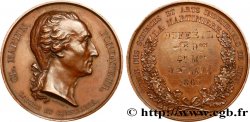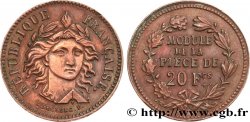E-auction 305-224545 - fme_400158 - II REPUBLIC Médaille pour la mort de Denys Auguste Affre
You must signin and be an approved bidder to bid, LOGIN TO BID. Accounts are subject to approval and the approval process takes place within 48 hours. Do not wait until the day a sale closes to register. Clicking on « bid » constitutes acceptance of the terms of use of cgb.fr private e-auctions.
Bids must be placed in whole Euro amounts only. The sale will start closing at the time stated on the item description; any bids received at the site after the closing time will not be executed. Transmission times may vary and bids could be rejected if you wait until the last second. For further information ckeck the E-auctions F.A.Q.
NO BUYER'S FEE.
NO BUYER'S FEE.
| Estimate : | 150 € |
| Price : | 31 € |
| Maximum bid : | 211 € |
| End of the sale : | 18 February 2019 18:20:30 |
| bidders : | 4 bidders |
Type : Médaille pour la mort de Denys Auguste Affre
Date: 1848
Mint name / Town : 75 - Paris
Metal : tin
Diameter : 51 mm
Orientation dies : 12 h.
Weight : 33 g.
Edge : lisse
Coments on the condition:
Médaille en étain avec une patine hétérogène mais des reliefs néanmoins assez nets
Obverse
Obverse legend : R-F.
Obverse description : Écu de la ville de Paris sur fond de canons et de drapeaux.
Reverse
Reverse legend : LA VILLE DE / PARIS À LA MÉMOIRE / DE DIS AFFRE DIGNE / ARCHEVÊQUE BLESSÉ / MORTELLEMENT À LA / BARRICADE DU FG ST / ANTOINE MORT LE / 27 JUIN 1848.
Reverse description : Légende en huit ligne horizontales.
Commentary
Denys Auguste Affre, né à Saint-Rome-de-Tarn (Aveyron), le 27 septembre 1793, et mort à Paris, le 27 juin 1848, fut le 126e archevêque de Paris.
Pendant les insurrections de juin 1848, il crut que sa présence près des barricades pût être un moyen de ramener la paix. Il en fit part au général Louis Eugène Cavaignac, qui le mit en garde contre les dangers qu’il courait. « Ma vie, répondit-il, a peu de valeur, je la risquerai volontiers. » Le 25 juin, les tirs ayant cessé à sa demande, il apparut sur la barricade à l’entrée du Faubourg Saint-Antoine, accompagné par M. Albert, de la Garde nationale, habillé comme un ouvrier et arborant une branche verte en signe de paix, et par Pierre Sellier, un domestique qui lui était dévoué. Ses deux vicaires généraux, Antoine Jaquemet et Jules Ravinet, futurs évêques de Nantes et de Troyes, étaient également présents sur les lieux mais auraient été séparés de lui dans la confusion générale.
Il fut accueilli dans la stupeur, mais à peine eut-il prononcé quelques mots qu’un coup de feu relança les hostilités. On l’amena au presbytère de Saint-Antoine, et il fut ramené le lendemain à l'hôtel Chenizot au 51 rue Saint-Louis en l'Ile, devenu sa résidence depuis 1846, où il mourut le 27 juin, vers 4h30 du matin..
Pendant les insurrections de juin 1848, il crut que sa présence près des barricades pût être un moyen de ramener la paix. Il en fit part au général Louis Eugène Cavaignac, qui le mit en garde contre les dangers qu’il courait. « Ma vie, répondit-il, a peu de valeur, je la risquerai volontiers. » Le 25 juin, les tirs ayant cessé à sa demande, il apparut sur la barricade à l’entrée du Faubourg Saint-Antoine, accompagné par M. Albert, de la Garde nationale, habillé comme un ouvrier et arborant une branche verte en signe de paix, et par Pierre Sellier, un domestique qui lui était dévoué. Ses deux vicaires généraux, Antoine Jaquemet et Jules Ravinet, futurs évêques de Nantes et de Troyes, étaient également présents sur les lieux mais auraient été séparés de lui dans la confusion générale.
Il fut accueilli dans la stupeur, mais à peine eut-il prononcé quelques mots qu’un coup de feu relança les hostilités. On l’amena au presbytère de Saint-Antoine, et il fut ramené le lendemain à l'hôtel Chenizot au 51 rue Saint-Louis en l'Ile, devenu sa résidence depuis 1846, où il mourut le 27 juin, vers 4h30 du matin..








 Report a mistake
Report a mistake Print the page
Print the page Share my selection
Share my selection Ask a question
Ask a question Consign / sell
Consign / sell
 Full data
Full data



